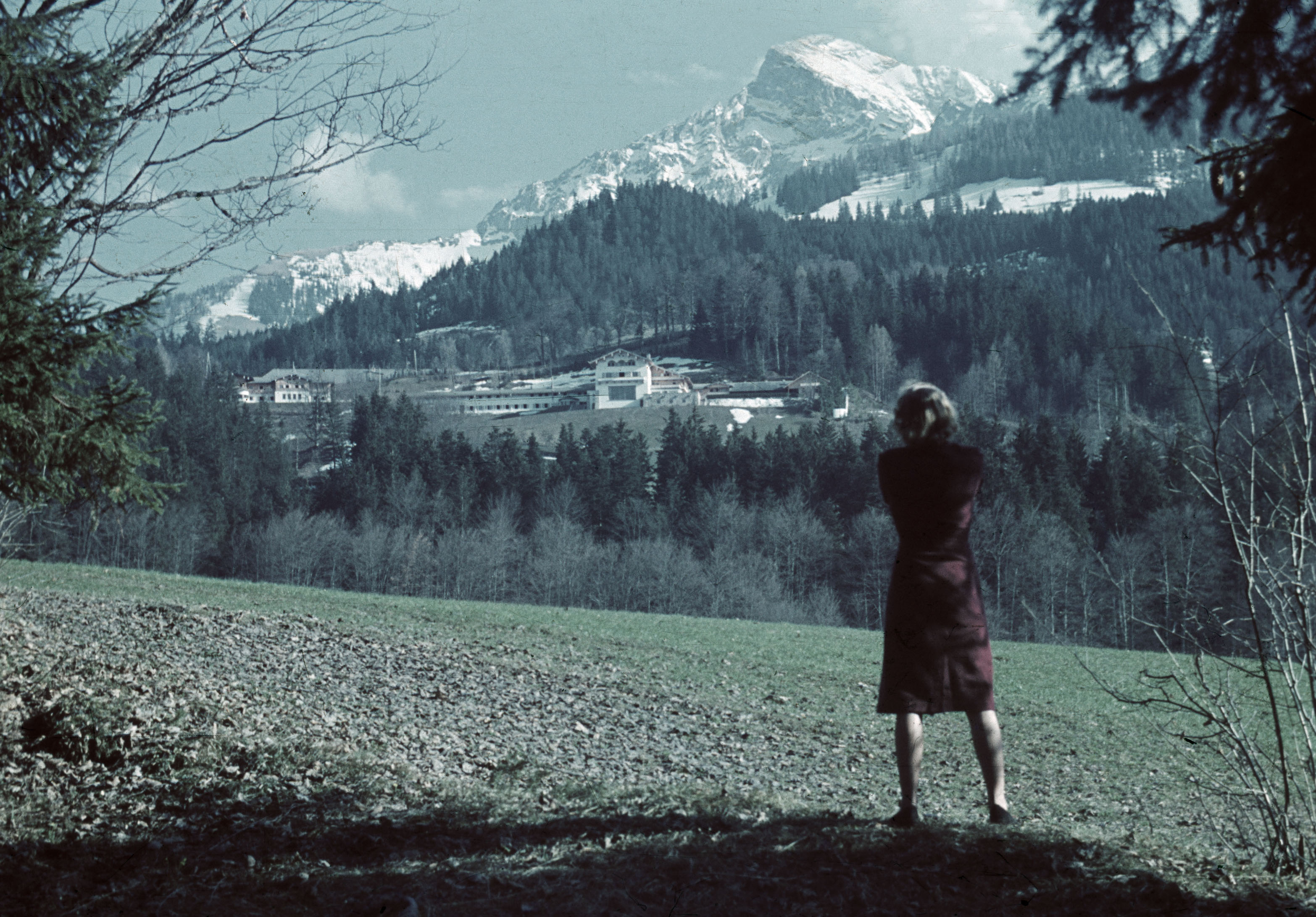Sixty-seven years after her death, Eva Braun, the long-time mistress of Adolf Hitler, remains a mysterious figure. Heike G. Görtemaker, a German historian and author, attempts to add clarity to the life of a woman who met Hitler as a teenager and, in the last days of the war, became the führer’s wife—only hours before committing suicide. In Görtemaker’s book Eva Braun: Life with Hitler (Knopf, 2011), she argues that the conventional wisdom about Braun—that she was a dumb blonde and a largely inconsequential figure—is false. Görtemaker, who earned a PhD in history from Free University, Berlin, asserts that Braun and the wives of Nazi leaders should be viewed unsympathetically: even if they weren’t decision-makers, they shared Hitler’s worldview.
 When Eva Braun met Hitler, she was a 17-year-old photo shop assistant and he was a 40-year-old firebrand. What did they see in each other?
When Eva Braun met Hitler, she was a 17-year-old photo shop assistant and he was a 40-year-old firebrand. What did they see in each other?
Not a single letter from Hitler addressed to his mistress, or a single letter from Eva Braun addressed to Hitler, has ever been recovered. We just have different accounts from former members of Hitler’s inner circle, like Albert Speer, the adjutant Julius Schaub, and others. When Eva Braun first met Hitler in October 1929, he was already a well known politician in Munich, and she had just started her work in the studio of Hitler’s personal photographer, Heinrich Hoffmann—and this is almost all we can say. The development of their relationship before 1935 remains unclear. After the war, the Braun family, as well as Hoffmann, were not interested at all in speaking. Both had to establish the greatest possible distance between themselves and the Nazi system in order to save their own lives and livelihoods. They had to hide the fact that they once belonged to Hitler’s close circle.
Braun is commonly considered a mere background figure in Hitler’s life. You dispute that idea in your book.
The lack of primary sources about Braun, and the dominant memoir literature, especially the popular autobiography by Speer, made it easy to view her as a disappointment of history because she didn’t take part in the decision making leading up to the crimes committed by the Nazis. Biographies portray her as a tragic or ridiculous figure who, mostly ignored by Hitler, spent her life waiting for him and who hardly knew anything about the course of events around her. They mainly assume an unfilled existence—a life disconnected from Hitler’s political activities. But the sources available now show that Eva Braun has to be seen as part of Hitler’s inner circle and not apart from it. Her life should not be called lost or tragic. She wanted to be at Hitler’s side, and fought very hard, with all means, to achieve that position.
So she was much more than just a simple-minded blonde?
Oh, yes. This notion of the dumb blonde was created after the war in the memoir literature by all these Hitler cronies, who hated her. And we later were told that she was unintelligent and totally uninterested in politics. The Nazi women said after the war that they had nothing to do with politics at all. Even Ilse Hess, who was an early campaigner for the National Socialists and a member of the party since 1921, said after the war that she had nothing to do with politics—and as a woman had always been passive. But that was not true—and not true for Eva Braun. Braun became part of the Nazi propaganda machinery. She served not just as decoration; she took pictures and films portraying Hitler at his Berghof retreat as a likeable caring person and family man, fond of children. But he wasn’t a family man. And she sold these so-called private pictures to Heinrich Hoffmann, and in doing so earned a lot of money—she got 20,000 marks for one of her [home] movies. She was very rich. It cannot be said how many pictures published by Hoffmann in his famous picture books about the private life of the führer were actually taken by Eva Braun.
Should she be considered a collaborator?
Over the 14-year [span] of her relationship with Hitler, Braun developed a very important role within the inner circle. She changed from a rather shy and insecure person into a determined woman—a capricious, uncompromising champion of absolute loyalty to the dictator. As early as 1936, nobody in the inner circle could challenge her position. Even Albert Speer and the powerful Joseph Goebbels and others sought her company in order to get a closer personal [connection] to Hitler. So within the hierarchy of Hitler’s inner circle, Eva Braun had a strong position. As one female guest later said, to be invited to the Berghof it was absolutely necessary to get on well with Braun. If you couldn’t get along well with her, you weren’t invited.
Was Braun interested in politics or the war, or aware of the atrocities?
Yes. It is true that Braun did not belong to the [Nazi Party]. But that fact does not mean that she rejected the Nazi state or was opposed to it in any way. On the contrary, her life, like that of everyone else around Hitler, was shaped by his worldview—by his charisma and his power. The members of the so-called Berghof circle, men and women, identified with the anti-Semitic, racist worldview and aggressive expansionist policies of the Nazi regime. So the collaboration, within the scope of what was possible for her, was unmistakable. It cannot be verified that she knew about the Holocaust, but she certainly was informed about the persecution of Jews and the deprivation of their rights. It is also clear that she supported this policy. Despite the fact that she did not appear in public, she was not a passive bystander.
Did she and Hitler have a conventionally intimate relationship?
We can’t really say. Christa Schroeder, Hitler’s longtime secretary, [wrote] in her memoir that the relationship had only been for show, but she had earlier admitted, in an interrogation by Allied officers in May 1945, that Hitler had treated Braun like his wife.
What was behind her two suicide attempts?
The exact circumstances of her first attempt at the end of 1932, which involved a pistol belonging to her father, remain unclear. And the same is true of the second in 1935. There are differing accounts of exactly what happened and when—did Braun act calculatedly to make the absent Hitler notice her? Did she actually blackmail him? We can only speculate. But in any case, only a year after his niece’s suicide, and in the middle of his political battle for the chancellorship, Hitler could not afford a new private scandal. So therefore he had to bring under control a relationship he had apparently misjudged. We can assume with this extreme act that Braun showed Hitler early on her readiness to die. And in his eyes, perhaps, this act proved the kind of self-sacrifice that he expected from all his followers.
Was being Hitler’s mistress a sacrifice?
She had a thankless role to play, with no status as a wife, not least because of Hitler’s own anxieties and lack of self- confidence. The existence of a mistress did not fit with the successfully cultivated myth of the lonesome führer who sacrificed his personal life for the cause of the German people. He feared the influence of a wife and of a family. His own blood relations had to stay away from him. As a mistress Eva Braun had no legal [rights] and remained in a dependent position.
 She was very calm, even carefree, in the last days of the war. Why?
She was very calm, even carefree, in the last days of the war. Why?
Eva Braun was, at the end, where she wanted to be. And keep in mind that she was very convinced about what Hitler did. He was her hero—and this was true for all other members of the inner circle. Her behavior in her last weeks in the Berlin bunker, her willingness to die with Hitler, reveal a stern character. Some sources indicated that she, at the end, encouraged Hitler’s self-deception; and that she supported his delusion that he was surrounded by traitors. There are indications that even Martin Bormann and Speer feared her at the end. Neither of them wanted to die; they tried to escape from the bunker. So Eva Braun was one of Hitler’s last and most loyal disciples. She certainly believed at the end to die with him a hero’s death.
Was their marriage shortly before their suicide her idea or his?
Both.
Quite a Shakespearean moment.
Oh, yes, very Shakespearean: the doom of the Reich. But he was very thankful [for her]. To one of his adjutants, Hitler said: This woman came to me at a time when all others were leaving me. You can’t believe what this meant to me. He was very thankful that she stayed loyal to him; that she didn’t leave him like Himmler and Speer and all the other Nazis.





